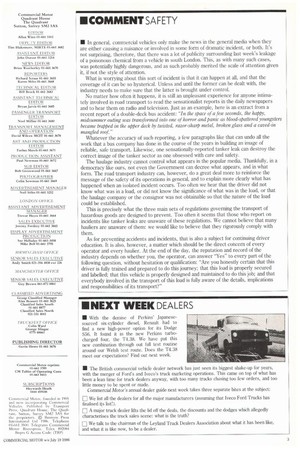• COMMENT SAFETY • In general, commercial vehicles only make
Page 5

If you've noticed an error in this article please click here to report it so we can fix it.
the news in the general media when they are either causing a nuisance or involved in some form of dramatic incident, or both. It's not surprising, therefore, that there was a lot of publicity surrounding last week's leakage of a poisonous chemical from a vehicle in south London. This, as with many such cases, was potentially highly dangerous, and as such probably merited the scale of attention given it, if not the style of attention.
What is worrying about this sort of incident is that it can happen at all, and that the coverage of it can be so hysterical. Unless and until the former can be dealt with, the industry needs to make sure that the latter is brought under control.
No matter how often it happens, it is still an unpleasant experience for anyone intimately involved in road transport to read the sensationalist reports in the daily newspapers and to hear them on radio and television. Just as an example, here is an extract from a recent report of a double-deck bus accident: "In the space of a few seconds, the happy, midsummer outing was transformed into one of horror and panic as blood-spattered youngsters became trapped in the upper deck by twisted, razor-sharp metal, broken glass and a caved-in mangled roof" Whatever the accuracy of such reporting, a few paragraphs like that can undo all the work that a bus company has done in the course of the years in building an image of reliable, safe transport. Likewise, one sensationally-reported tanker leak can destroy the correct image of the tanker sector as one obsessed with care and safety.
The haulage industry cannot control what appears in the popular media. Thankfully, in a democracy like ours, not even the Government can decree what appears, and in what form. The road transport industry can, however, do a great deal more to reinforce the message of the safety of its operations in general, and to explain more clearly what has happened when an isolated incident occurs. Too often we hear that the driver did not know what was in a load, or did not know the significance of what was in the load, or that the haulage company or the consignor was not obtainable so that the nature of the load could be established.
This is precisely what the three main sets of regulations governing the transport of hazardous goods are designed to prevent. Too often it seems that those who report on incidents like tanker leaks are unaware of these regulations. We cannot believe that many hauliers are unaware of them: we would like to believe that they rigorously comply with them.
As for preventing accidents and incidents, that is also a subject for continuing driver education. It is also, however, a matter which should be the direct concern of every operator and every haulier. At the end of the day, the reputation and record of the industry depends on whether you, the operator, can answer "Yes" to every part of the following question, without hesitation or qualification: "Are you honestly certain that this driver is fully trained and prepared to do this journey; that this load is properly secured and labelled; that this vehicle is properly designed and maintained to do this job; and that everybody involved in the transport of this load is fully aware of the details, implications and responsibilities of its transport?"




























































































